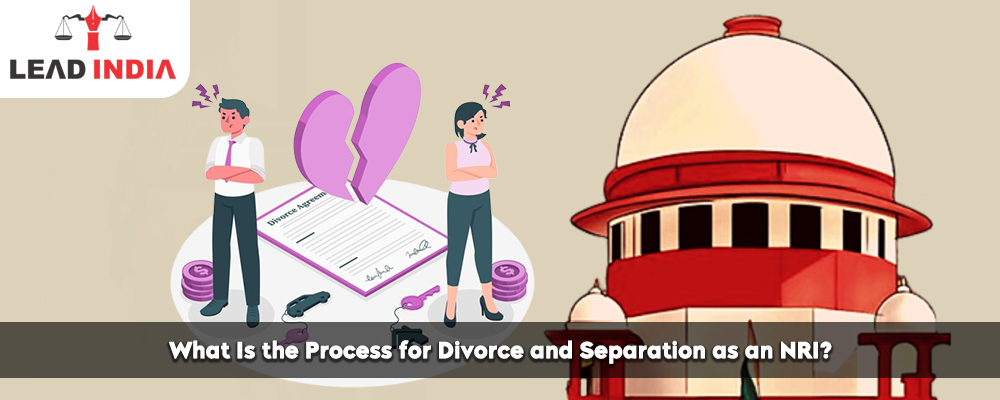An Indian who travels abroad for employment or education and has an Indian passport is known as a non-resident Indian. Divorce is a very complex procedure; if one of the parties does not reside in India, it might get more difficult and complex in the matter of an NRI divorce.
A feature of most Indian marriage laws is known to be the judicial separation, which however allows the husband and the wife to decide whether to give a chance to their marriage again before proceeding with the divorce procedure.
The spouses must live apart for a predetermine time after a judicial separation order is grant or allow by the court of law to provide them enough privacy, independence, and as well as the best time to think about getting back together.
During this particular phase, the legal position of the parties as husband and wife does not change. The two-year judicial separation period gives the couple ample amount of time to reflect, work out the marital issues, as well as try to get back together.
Need A Legal Advice
The internet is not a lawyer and neither are you. Talk to a real lawyer about your legal issue

Divorce and Judicial Separation: How Are They Different?
- The time period provided for filing a petition is one of the many distinctions between judicial separation and the divorce. Couples however now have a quicker way to solve their differences after the marriage, they can file a petition for judicial separation at any point of time after getting marry. However, a divorce petition can only be submit after a year of marriage, a restriction meant to encourage couples to try every possible way to work out a reunion before filing for divorce.
- Another domain where judicial separation and divorce differ is in remarriage. Following a judicial separation decree, the parties’ marital status is still in effect, but suspended, therefore they are unable to remarry. On the other hand, once a divorce decree is in place, the parties can legally dissolve their prior marriage and get marry again.
- A judicial separation or divorce decree is grant on several grounds. A judicial separation decision can be obtain with only one act of adultery. On the other hand, a divorce decree usually necessitates living in an adulterous relationship or meeting certain legal requirements, which can differ based on the jurisdiction. These reasons could include irreconcilable conflicts, harshness, or abandonment.
Process of Divorce as an NRI
- A divorce petition must be submit to the court by the parties.
- The support or the maintenance amount and child custody for any children born out of the marriage must be agree upon beforehand by the parties.
- Six months will pass after the date of the plea presentation, often referred to as the first motion, in this case.
- The parties must then show up in court to formally confirm their mutually consenting divorce. This will verify the information.
- The divorce petition may be withdrawn or return by any party within six months of the second motion.
Process of Separation as an NRI
- An Indian court with the authority to hear the case may receive a petition for judicial separation from an NRI. Although a foreign court may accept a petition for the same, there are various concerns over the legality of the court’s ruling in India.
- Following the Hindu Marriage Act, 1955, or other relevant personal laws like the Special Marriage Act, 1954, one spouse files a petition in the relevant Indian court (family or district court). The legitimate grounds (that includes cruelty, adultery, or desertion) for the purpose of judicial separation should be properly state or mention in the petition.
- Since the couple might not be present in India for the entire separation process, the NRIs usually designate a legal representative for this process.
- A trust able person or maybe an attorney is grant Power of Attorney by the spouse to manage all the legal matters while they are away from India.
- In addition to hearing from both parties to the case as well as reviewing all the important evidence, the court of law may decide to schedule a mediation as any type of counseling session for the parties to the case. Each spouse has to provide pertinent and important records as well as any evidence regarding the reasons for the judicial separation.
- The court then however issues an order of judicial separation if it finds the justifications of the petition convincing and appropriate. This then allows the parties to the case to live apart while still being legally marry, unlike divorce, which usually dissolves the marriage.
This blog covered the NRI divorce as well as separation procedure. If the divorce order received from a foreign court does not comply with the conditions outlined in Section 13 of the CPC, it may be declare illegal and cannot be implemente in India. The court procedures can be conduct by a lawyer using a power of attorney or by mutual consent, thus traveling to India is not require. It’s also advisable to select an online lawyer who is knowledgeable about Indian divorce rules that apply to non-resident Indians (NRIs), even if the divorce is happening outside.
One can talk to a lawyer from Lead India for any kind of legal support. In India, free legal advice online can be obtain at Lead India. Along with receiving free legal advice online, one can also ask questions to the experts online free through Lead India.





 Talk to a Lawyer
Talk to a Lawyer